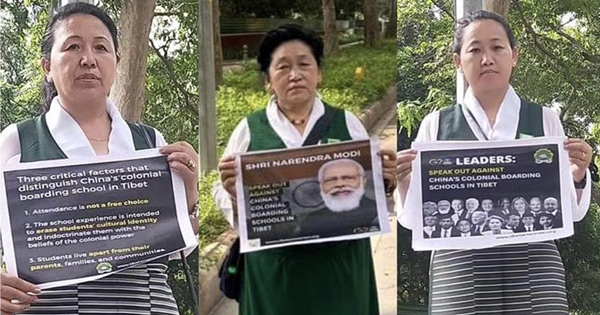New Delhi – Executive members of the Central Tibetan Women's Association submitted letters to the embassies of countries in New Delhi on Chinese colonial boarding schools in Tibet and human rights violations of Tibetans in occupied Tibet. They also urged PM Narendra Modi and other leaders to raise these issues and Tibet at the next G20 meeting, to be held in the second week of September 2023, in New Delhi, India.
Members of the Central Tibetan Women's Association (TWA), including the President of TWA, have submitted letters to the embassies of countries in New Delhi, regarding Chinese colonial schools in Tibet and violations of the human rights of Tibetans by the Chinese authorities in occupied Tibet. They also urged Prime Minister Nerendra Modi and other world leaders to raise these issues at the next G20 meeting, to be held on 9-10 September 2023, in New Delhi, India.
The Tibetan Women's Association urged the leaders and delegations of the Group of 20 countries to raise the issue of the Chinese Communist Party's forced boarding schools in Tibet, which aim to eradicate Tibetan identity, the separation of children from their parents, the Chinese government's violations of the fundamental human rights of Tibetans, the destruction of the environment, etc. at the 18th G20 Summit, to be held at the Bharat Mandapam International Exhibition-Convention Centre, Pragati Maidan, in New Delhi, India.
The Tibetan Women's Association said," G20 leaders, speak out against China's colonial boarding schools in Tibet." Another member added by saying," Sheri Narendra Modi, speak out against China's colonial boarding schools in Tibet."
They stated: "Three main factors distinguish the Chinese colonial boarding school in Tibet: firstly, attendance is not a free choice; secondly, the school experience aims to eradicate the students' cultural identity and indoctrinate them with the beliefs of the colonial power; thirdly, the students live separated from their parents, family and community".


![Tibet has a rich history as a sovereign nation until the 1950s when it was invaded by China. [Photo: File]](/images/stories/Pics-2024/March/Tibet-Nation-1940s.jpg#joomlaImage://local-images/stories/Pics-2024/March/Tibet-Nation-1940s.jpg?width=1489&height=878)
















